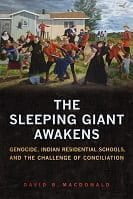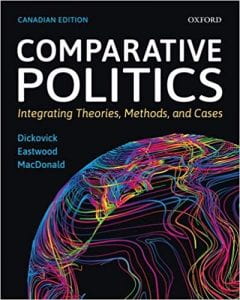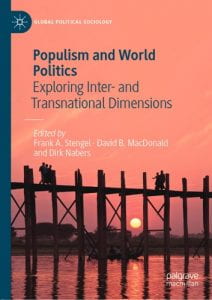Welcome to my Professional Website!
 Here you will find details of my work as a Political Science Professor at the University of Guelph.
Here you will find details of my work as a Political Science Professor at the University of Guelph.
From 2017 to 2020 I served as the Guelph Research Leadership Chair for the College of Social and Applied Human Sciences. I am a bi-racial Indo-Trinidadian and Scottish settler academic from Treaty 4 lands in Regina, Saskatchewan (kisiskâciwanisîpiy). On my Mom’s side we are descended from girmitiyas (indentured labourers) from Uttar Pradesh and Bihar who were shipped (from 1856) to three sugar plantations in the rural south of Trinidad.
Since 2007 I have been a faculty member at the University of Guelph, and I was promoted full professor in 2013. From 2002-2007 I was a Lecturer, then Senior Lecturer in the Political Studies Department at the Ōtākou Whakaihu Waka, Aotearoa New Zealand. Before this time, from 1999-2002, I was Assistant Visiting Professor at the École Supérieure de Commerce de Paris (now ESCP-Europe). I currently have an Honorary Academic position (2024-2028) in Politics and International Relations, at Waipapa Taumata Rau / University of Auckland. I obtained my PhD in International Relations in 2001 from the London School of Economics. My research since 2008 has been generously funded by the Social Sciences and Research Council of Canada and the University of Guelph.
I have been an active researcher for over two decades, with an emphasis on settler colonialism, Indigenous-settler relations, truth and reconciliation processes, genocide studies, identity politics and collective memory, comparative race relations, and multiculturalism. My work reflects the University’s Strategic Research Plan in promoting “excellence, partnership, diversity, and inclusivity” while seeking to use “knowledge and discoveries in impactful ways to shape understanding and improve life”. I research and write comparatively across Canada, Aotearoa New Zealand, Australia, and the United States.
My research output includes four sole authored books; four co-authored text books; four co-edited books; and co-edited academic journal special issues. I have also written or co-written 31 refereed articles/contributions, 40 book chapters, and close to 100 conference keynotes, presentations, papers, and panels. My Social Sciences and Humanities Research Council grants as Principal Investigator are all focused on diversity and Indigenous-settler relations. The same is true of the Partnership Development Grants on which I am or was a co-applicant, alongside three Connections Grants.
My research and teaching are closely interrelated, and draw in part on my training as a political scientist (in International Relations and Comparative Politics) and on my positionality as a racialized person.
I have been active in the International Studies Association since 2006. Currently, I serve on two committees:
- ISA President’s Ad Hoc Committee on Indigenous Justice: Co-Chair (with Sheryl Lightfoot), this committee was formed after the 2023 ISA conference. In this capacity I co-wrote the ISA land acknowledgment for 2024, and chaired the President’s Plenary session.
- ISA Committee on the Status of Representation and Diversity: Member from March 2023 for a three year term. The role is to “focus on underrepresented groups within ISA. The Committee aims to work jointly with other groups and caucuses to promote the diversity enterprise of the ISA as a whole.”
In terms of research funding, I have had multiple and continuous grants from the SSHRC since 2008. I am currently the PI on a SSHRC Insight Grant: “Maximizing Indigenous Self-Determination: Theory and Practice of Indigenous Sovereignties in Settler States and the International System” Principal Investigator (with Sheryl Lightfoot 2023-2028)
Three recent SSHRC grants are:
- “Complex Sovereignties: Theory and Practice of Indigenous-Self Determination in Settler States and the International System” Principal Investigator (with Sheryl Lightfoot 2017-2023)
- “Decolonizing Settler States: Unravelling Systemic Blockages to Indigenous Rights in State Institutions and Civil Society” Co-Investigator (2021-24; value $199,796, ongoing) Partnership Development Grant (PI Sheryl Lightfoot)
- “Settler Colonialism In Canada: Perspectives, Comparisons, Cases” (2022; value $32,474; Conference in September and October 2022) SSHRC Connections Grant 2022 (with Emily Grafton Lead and Jérôme Melançon) workshop on settlers “Settler Colonialism in Canada: Perspectives, Comparisons, Cases.”
For my Insight Grant project website, please visit the Complex Sovereignties website.
I am the North American series editor for the Palgrave MacMillan book series Global Political Sociology.
I am an honorary academic at Waipapa Taumata Rau / University of Auckland, and a Fellow at Te Puna Rangahau o te Wai Ariki, NZ Centre for Indigenous Peoples and the Law, Law School, Aotearoa New Zealand. https://www.auckland.ac.nz/en/law/our-research/research-centres/aotearoa-nzc-indigenous-peoples-law.html
A few current of my current publishing projects include:
- Completing book: Historiography and Settler Myths of Reconciliation (under contract with Cambridge University Press in Daniel Wolff’s historiography series due January 2025)
- Completing second edition of Populism and World Politics: Exploring Inter- and Transnational Dimensions, co-edited with F.A. Stengel and D. Nabers (Palgrave MacMillan, completion August 2024, for publication 2025).
- In Press: On Settler Colonialism in Canada: Lands and Peoples co-edited with Emily Grafton (Regina: University of Regina Press, 17 chapters, for publication August 2025) 340 pp approximately.
- Completing final edits to co-edited book: On Settler Colonialism in Canada: Relations and Resistances, co-edited with Emily Grafton (Regina: University of Regina Press, 18 chapters, under final review for publication January 2026).
Recent Publications
The Sleeping Giant Awakens: Genocide, Indian Residential Schools, and the Challenge of Conciliation (University 0f Toronto Press, 2019) 244 pp
Based on archival research and extensive interviews with residential school survivors, officials at the Truth and Reconciliation Commission of Canada, and others, The Sleeping Giant Awakens offers a unique and timely perspective on the prospects for conciliation after genocide, exploring how moving forward together is difficult in a context where many settlers know little of the residential schools and the ongoing legacies of colonization, and need to have a better conception of Indigenous rights. It offers a detailed analysis of how the TRC approached genocide in its deliberations and in the Final Report. Crucially, MacDonald engages critics who argue that the term genocide impedes understanding of the IRS system and imperils prospects for conciliation. By contrast, this book sees genocide recognition as an important basis for meaningful discussions of how to engage Indigenous-settler relations in respectful and proactive ways. Reviews“David B. MacDonald incites the reader to do some serious soul searching about the true nature of Canada. Canadians are called upon to engage in fresh thinking and create a new, right, and respectful relationship with Indigenous peoples. It will involve deep questioning of the status quo, vision, and imagination to clear the new path. The Sleeping Giant Awakens is a catalyst for necessary change.” Shelagh Rogers, OC, TRC Honorary Witness, Chancellor, University of Victoria “The Sleeping Giant Awakens presents a thorough and forceful examination of Canada’s history with Indigenous peoples. By exploring the colonial, even genocidal, legacy of the Indian residential school system, This book represents a tough, timely, and thoughtful account. Our progress towards reconciliation depends on a true and unflinching acknowledgment of this dark chapter in Canadian history.” Mike DeGagné, President and Vice-Chancellor, Nipissing University, and Executive Director of the Aboriginal Healing Foundation “The Sleeping Giant Awakens probes the decolonizing, transformative potential of (re)conciliation between Indigenous and settler peoples in Canada through the lens of settler colonial genocide. MacDonald argues that the United Nations Genocide Convention (UNGC) applies to Canada’s Indian residential school system and Sixties/Seventies Scoops, deepening our understanding of how genocidal systems and structures function over time in settler colonial states. Documenting the Truth and Reconciliation Commission of Canada’s work and challenging Canada’s settler colonial historical and multicultural narratives, he MacDonald makes a compelling case for why Canadians must confront a hard truth − that government actions to destroy Indigenous peoples’ cultures, governance systems, and laws through forcible child removals and land dispossession constitute genocide. Settler peoples must then accept responsibility for taking up the TRC’s calls to action in ways that roll back state rights to fully recognize Indigenous rights of self-determination and resurgence and ensure the return of Indigenous lands. A must-read for all those who care deeply about the ongoing journey of truth, justice, and reconciliation in post-TRC Canada and beyond.” Paulette Regan, senior researcher and lead writer on the reconciliation volume of the TRC Final Report and author of Unsettling the Settler Within: Indian Residential Schools, Truth Telling, and Reconciliation in Canada Comparative Politics: Integrating Theories, Methods, and Cases, First Canadian Edition co-authored with T. Dickovick and J. Eastwood (Oxford University Press Canada, 2020).
|






